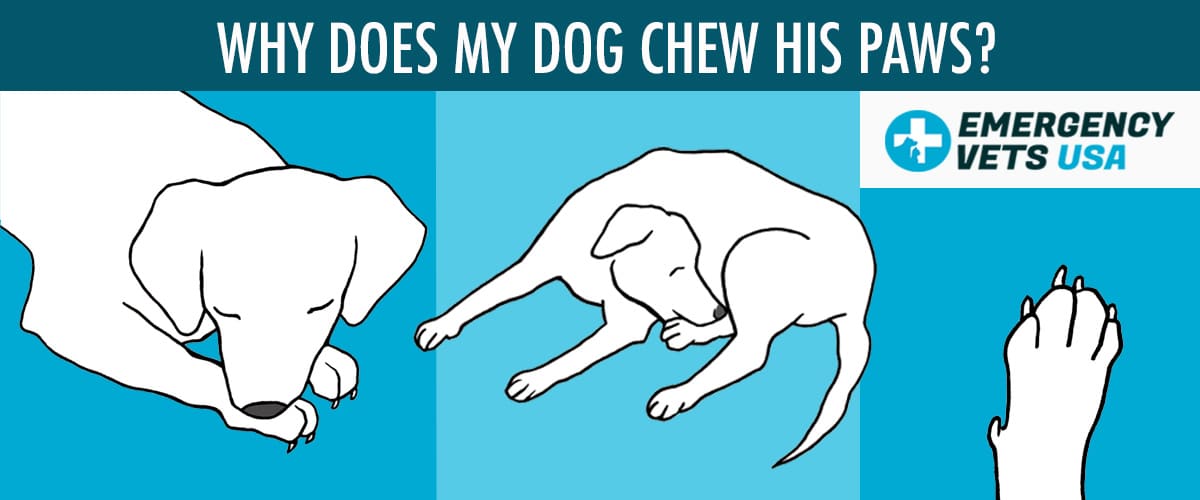Decoding Dog Paw Chewing: Why Your Pup Nibbles and What to Do
Ever catch your dog gnawing on their paws like a tasty bone? While occasional paw licking is normal grooming behavior, frequent or obsessive paw chewing can signal an underlying issue. Understanding why dogs engage in this behavior is crucial to addressing their discomfort and preventing further problems.
Paw chewing, also known as paw licking or paw biting, is a common canine behavior with a range of potential causes. It’s important to differentiate between normal grooming and excessive licking or chewing. A quick lick after a walk to clean off dirt is typical. However, persistent gnawing, redness, inflammation, or hair loss around the paws indicates a problem that requires attention.
Several factors contribute to a dog's compulsion to chew their paw pads. Allergies, particularly to environmental allergens like pollen, dust mites, or certain foods, are frequent culprits. These allergens can irritate the skin, causing itchiness and prompting dogs to chew for relief. Parasites like fleas, ticks, and mites can also trigger intense itching and subsequent paw chewing. In some cases, dogs chew their paws due to boredom, anxiety, or stress. This behavior can become a compulsive habit, offering a temporary distraction from underlying emotional distress.
Ignoring excessive paw chewing can lead to several complications. Continuous licking and chewing can break the skin, creating open wounds susceptible to infection. Chronic inflammation can thicken the skin and alter its pigmentation. Furthermore, untreated underlying causes, such as allergies or anxiety, can worsen over time, impacting your dog's overall health and well-being.
Determining the reason behind your dog's paw chewing requires careful observation and, often, veterinary guidance. Look for accompanying symptoms like skin redness, swelling, hair loss, or changes in behavior. Keep a log of when the chewing occurs, noting any potential triggers like walks in certain areas or exposure to specific foods. This information will be invaluable when consulting with your veterinarian.
While occasional paw licking is normal, frequent and intense paw chewing can indicate underlying issues like allergies, parasites, or anxiety. Identifying the cause is crucial for effective treatment.
If your dog's paw chewing is allergy-related, your veterinarian may recommend allergy testing to identify the specific allergens. Dietary changes, medication, or immunotherapy can help manage allergies and reduce itching. For parasite infestations, appropriate preventative treatments are essential. If anxiety or boredom is the culprit, increasing physical exercise, providing mental stimulation through puzzle toys, and creating a calm and predictable environment can help alleviate the behavior. In some cases, behavioral modification techniques or medication may be necessary.
Advantages and Disadvantages of Addressing Paw Chewing
| Advantages | Disadvantages |
|---|---|
| Improved dog comfort and well-being | Cost and time involved in diagnosis and treatment |
| Prevention of secondary infections | Potential side effects of medications |
| Reduced risk of chronic skin changes | Difficulty in identifying the underlying cause in some cases |
Addressing paw chewing improves your dog's comfort and well-being, prevents secondary infections, and reduces the risk of chronic skin changes.
Frequently Asked Questions
Why is my dog suddenly chewing its paws?
Sudden changes in paw chewing can be triggered by new allergens, parasites, or changes in environment or routine.
Can paw chewing be a sign of pain?
Yes, paw chewing can sometimes indicate pain in the paws, legs, or other parts of the body.
Is it normal for dogs to lick their paws after a walk?
Occasional licking after a walk to clean paws is normal, but excessive licking can signal a problem.
How can I stop my dog from chewing its paws?
Consult your veterinarian to identify the cause and determine the appropriate treatment.
What are the home remedies for dog paw chewing?
While some home remedies may offer temporary relief, it’s important to address the underlying cause with veterinary guidance.
Can stress cause paw chewing in dogs?
Yes, stress, anxiety, and boredom can lead to compulsive paw chewing.
When should I take my dog to the vet for paw chewing?
Consult your veterinarian if the chewing is frequent, intense, or accompanied by other symptoms like redness, swelling, or hair loss.
Are there any breeds prone to paw chewing?
Certain breeds with skin folds or allergies may be more prone to paw chewing.
Understanding why dogs chew their paws is essential for responsible pet ownership. By paying close attention to your dog's behavior, consulting with your veterinarian, and implementing appropriate treatment strategies, you can help your furry friend find relief from itchy paws and maintain optimal health and happiness. Don’t let paw chewing go unchecked. Take action to identify the cause and provide the necessary care to keep your dog’s paws healthy and pain-free.
30th birthday cake ideas for husband the ultimate guide to a delicious celebration
Elevating interiors with sw natural linen paint
Decoding the nfl draft how team ratings shape the future of football














